by Jenny Rose | Nov 29, 2018 | Choice, Power
Choice: an act of selecting or making a decision when faced with two or more possibilities (Online Oxford Dictionary).
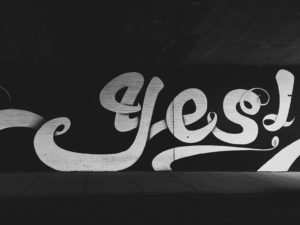
Photo by Jon Tyson on Unsplash
This morning I’ve been reading about doing one thing at a time and having too many choices. I’ve considered the paradox of choice: how important it is to understand our power to choose for ourselves and how unhealthy too many choices can be. I’ve thought about all the subtle ways I limit choice overload in my own life. For example, we have a large DVD collection. I like to watch my favorite movies and series over and over again, so I move through the shelves in alphabetical order when considering what I want to watch next. I do the same thing in our fiction library. My partner, on the other hand, likes to have as much choice as possible and can’t understand why I deliberately narrow the field in terms of entertainment or anything else.
It’s not mysterious. I do it because I don’t like the feeling of floundering around with too many choices. If I want to relax in front of a movie, I don’t want to have to endure an hour of deliberation first. I know I’m healthier and happier when I keep life simple. We know many people, faced with too many buying choices, walk away without buying anything. That’s me. I have a low tolerance for hassle and unnecessary complications.
Choosing is powerful, but there’s also a tricky, dark side of choice. When we’re compelled, addicted, manipulated or numbed, we become divorced from our ability to identify two or more possibilities and our power to choose. We’re asleep at the wheel of our own lives, abdicating both the struggle of choosing and owning the responsibility for our choices and their consequences. We stop learning. We become victims. We all know people like this. They protest their behavior is not their fault. They couldn’t help it. Somebody or something else made them do it. They refuse to be accountable.
According to the above definition, choice is an action. It’s something we do, which implies it can also be something we don’t do. Yet doing, not doing or refusing to choose are all choices. I had a boyfriend once who avoided choice. He wouldn’t say yes to going to the movies. He wouldn’t say no, either. I used to tell him refusing to choose was also a choice that resulted in steering my own choices, but he wouldn’t accept it. He focused his blame on me for the choices I made — in response to his.
The truth is we’re responsible for our behavior and decisions, whether they arise out of conscious choice or not.

Photo by Heidi Sandstrom on Unsplash
Modern American culture does an interesting thing. Our rightful power to choose has become shackled to consumerism. If you want to have a healthier body, for example, a wide array of diet programs, supplements and exercise equipment, clothing and technology is available to you. Want to become more effective and organized? There’s an app for that! Want love and connection? Buy it with diamonds, perfume, makeup, a phone plan, an insurance policy or a car!
We follow blindly along with all this because we’re brainwashed by our media consumption and the overculture. Our choice to improve our physical self-care leads to economic choices, not behavioral changes, even though we all know a gym membership is not useful unless we actually go to the gym and change our behavior! We are seduced onto distracting avenues of endless shiny, tantalizing, seductive promises of exactly what we want, if only we buy the right things.
In the meantime, our lives wither, we become enslaved by money, and the only choice we can recognize is whether to buy brand A or brand B. Our brief flicker of power in deciding to take better care of ourselves is extinguished by guarantees, reviews, special deals, customer service and returns. We give our time and energy to sorting through glittering products, rather than doing the inner work of noticing our self-destructive behavior and learning to manage our choice making more effectively.

Photo by Gemma Evans on Unsplash
I wonder if the power to make free and conscious choices is not the most important thing we can learn — and teach. To be disconnected from our ability to say yes or no is to be enslaved. Enslavement is, of course, the goal of advertising and marketing. Corporations wouldn’t pour billions of dollars into advertising if it didn’t richly reward them. Controlling our buying choices is big business, and our economy rests on it.
Becoming more conscious of our non-consumer choices is perfectly possible, but it requires we wake up and pay attention. It requires a silent place in our lives for inquiry and reflection. It requires a step back from our busy, multi-tasking lives, distractions and deeply-rooted habits. We can’t make free choices if we’re unwilling to be wrong or afraid of unforeseen consequences. We can’t manage choice if we refuse to be honest with ourselves and others. Most of all, we must be willing to take responsibility if we want to manage choice effectively and appropriately.
No one can take away our power to choose unless we allow them to. In every circumstance we can choose something, even if it’s just refusing to be disempowered by difficult events and experiences. It’s never too late to claim our ability to choose, including limiting our exposure to marketing, advertising and algorithms and finding ways to avoid choice overload. Chocolate or vanilla is a lot easier to choose between than 31 flavors.
The holidays are here, and with them even more choices to make than usual. It’s a good time to stay awake, pay attention to what we’re doing and why, and exercise our right to choose what works best for us, even if it’s wildly different from anything we’ve ever done before. We don’t need anyone else’s permission to choose for ourselves, and nobody has the right to choose for us.

All content on this site ©2018
Jennifer Rose
except where otherwise noted
by Jenny Rose | Aug 16, 2018 | Power
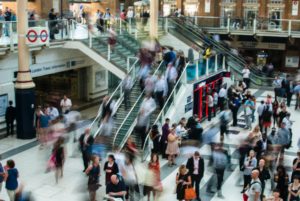
Photo by Anna Dziubinska on Unsplash
It’s easy these days to feel overwhelmed and despairing. Life is increasingly unpredictable and the future uncertain socially, economically and in terms of climate. We’ve never before been able to discuss so many issues with so many others, or been exposed to so many different sources of information and opinions. As our public education system flounders, fewer and fewer people think critically, which is daily becoming a more important tool in navigating our information overload.
I heard about a comment the other day on social media directed toward someone discussing women’s rights. The man commenting asked why we’re talking about something like feminism when climate change is so pressing. Why are we wasting energy on women’s rights while the planet is getting more and more difficult to inhabit, not in some hazy future but right now, today?

Photo by Nicole Mason on Unsplash
That question points to the reason we find ourselves in our present situation in the first place. Our social struggles reflect our approach to living on and with our planet. The thinking shaping our social behavior is the same thinking shaping our behavior as citizens on Planet Earth. If we feel we’re entitled to rape, rob or otherwise seize power and control over another human being or group of human beings, we feel equally entitled to use the planet however we want, with no thought of anyone else or the consequences of our behavior. This fertile, life-giving planet is our mother. We live on her body. The degree to which we respect and appreciate her is the degree to which we afford the same treatment to women. It’s the same discussion. It’s not a coincidence that the increasing pressure on our physical survival is happening in the middle of the current social maelstrom.
I’m not a scientist, though I endeavor to be a critical thinker. However, I’ve done quite a bit of reading on the subject of complex systems and earth systems science, including Darwin’s Unfinished Business by Simon Powell, Animate Earth by Stephan Harding, Overshoot by William Catton and Gaia’s Revenge by James Lovelock. Everything I read confirms what I intuitively recognize.
Everything matters. Everyone matters. It’s all connected.
The days are gone when we can tell ourselves what happens on the other side of the world doesn’t affect us and we need not pay attention or worry about it. We have so far exceeded the earth’s carrying capacity for our species that the actions of each individual have an effect on the whole. As human population oozes and bulges into every biome all over the globe, we also directly affect every other form of life: Animal, plant, insect, fungi and microorganism. We displace other species, poison their habitat and compete fiercely for resources. We have no sense of our own needs or the needs of others, but focus on what we want, and we want it all — right now. We deserve it. We have a right to it.
Certain groups of men have no intention of sharing power, dignity and economic resources with women, let alone sharing the planet with fungi and Monarch butterflies. Some groups would eradicate cattle from the globe before learning how to integrate them back into the healthy complex system they were part of until we threw things out of balance with our numbers and ignorance. Others work to bar immigrants, saying they’ll take our jobs, they’ll soak up social resources and they’ll poison our communities with their foreign tongues and culture, too ignorant and short-sighted to grasp we are only enriched and strengthened by the presence of other cultures.
It’s all the same discussion. It’s all connected.

Photo by NASA on Unsplash
We are only now beginning to glimpse the miraculous web of life on Earth, only now getting a sense of Earth as a sentient complex system, self-regulating and self-sufficient, and the knowledge may have come too late. Complexity is life. Complexity is resilient and creates the ability to learn and adapt. Any behavior or ideology seeking to minimize, disrupt, or eradicate complexity is destructive. Those who work for purity, for homogenized patriotism, for the complete power of one religion, sex, diet, complexion, body type or expression of sexuality are actively tearing apart our world and our future.
Our inability to live peacefully and cooperatively with one another is our inability to respect and care for the land under our feet. Our willingness to tolerate slavery, sex trafficking and bureaucracy that destroys families, indigenous groups, human rights, reproductive choice and other natural resources is the same willingness to worship the false idol of money, buy whatever we want when we want it and discard it later with impunity. If we can’t buy what we want, we take it, or steal it. This is the definition of rape culture.
Complexity is about integration. One way to interpret the old stories is to consider each character as a separate part of the same psyche. In other words, we all have an innocent Red Riding Hood maiden inside us, and we all have an old bedridden grandparent, a parent who warns us of the dangers of leaving the path, a wily predator and a heroic figure who saves the day. A healthy adult learns to know and accept his or her shadow side, as well as more admirable characteristics. Spiritual wholeness consists of a well-balanced masculine and feminine, no matter our biological sex. If we are unable to integrate all these voices and archetypes, all these facets of personality, feelings and thoughts, and operate as a whole complex psyche, we’re crippled, and we’re certainly going to be unable to take our place as an effective, joyous and elegant part of the wider complex system of Planet Earth.
So yes, it matters. It matters if you use a plastic straw and throw it away. It matters if you toss your plastic cup out the car window. It matters if you support the tobacco industry because they’ve successfully addicted you. If you throw one less item away today, it matters. If you recycle and compost, it matters. If you stop rototilling your garden, which damages the soil, it matters. The way you treat the people and animals around you matters. We don’t have the power to stop or change the enormous transition we’re caught up in by ourselves. We may never see validation, recognition or negative consequences for the choices we make, but those choices do matter, because we’re all inextricably connected, like it or not, deny it or not.
Megastorms matter. Lead in drinking water and cancer clusters matter. Water conservation efforts in Cape Town matter. Antibiotic-resistant bacteria matter. Fires, earthquakes and volcanic activity matter.
People matter, too. Our experience, feelings and thoughts matter. I don’t matter more than you or anyone else, but, as a living creature on the planet, I matter. The way I treat myself matters. My health matters, and my creativity, and my ability to learn.
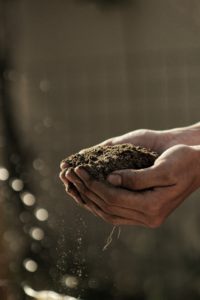
Photo by Gabriel Jimenez on Unsplash
If we can’t wrap our heads around the essential value and importance of each life, including our own, and support each individual in their personal power, we will absolutely destroy all non-human life on the planet and ourselves with it. If we’re really serious about equal rights, we need to learn to share our rapidly diminishing resources, and I don’t mean cars, technology and food delicacies grown half a world away. I don’t mean diamonds, designer clothing, private airplanes and yachts, and mansions housing a family of four. I mean basic food, clean water and habitable land. We each need to take responsibility for our addiction to instant gratification, convenience and all the latest tech, toys and trends. We need to let go of our entitlement and work together to create a sustainable standard of living for everyone.
So yes, food and water politics, sexual identity politics, human rights, healthcare, education, families and children and immigration all matter. They’re all road signs and mile markers. The question is whether we’ll travel in the direction of destruction or use these issues as opportunities to build bridges, enlarge our empathy and heal our disconnection from ourselves, from other humans, and from all other life, paving the way to managing climate change as elegantly as possible.
I know what direction I’m going in, not with hope of reaching some kind of utopia, but because it’s the only direction that makes any sense to me. Many, many people disagree with me, I know, and I’m going to have to fight the mob going in the direction of destruction. That’s okay. I never seem to be traveling in the direction of the majority, so I’m used to it, and there will be others going my way.
In the meantime, I walk the tightrope suspended over the paradox at the heart of modern life. I fight to maintain power and authority in my own life and use it for the greater good as well as my own benefit. At the same time, I acknowledge I am but one life among uncounted living beings on the planet, spinning through space with everyone else towards an uncertain future. My power is present, but limited. If I make even the smallest difference for good in my lifetime, I’ll probably never know, and no one else will ever see, and that’s okay with me.
It still matters.
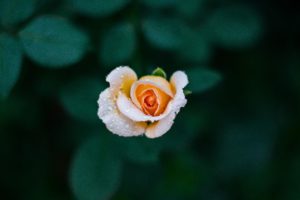
Photo by Ivan Jevtic on Unsplash
All content on this site ©2018
Jennifer Rose
except where otherwise noted
by Jenny Rose | Jul 5, 2018 | Power
“Always forgive your enemies; nothing annoys them so much.”
― Oscar Wilde
It’s been a chaotic week for me of fear, memories, fire, grief, a couple of new friends and unfinished emotional business resulting in a foul snarl of neglected feelings. Also, in common with millions of others, we are sweltering under a heavy blanket of heat and humidity and I feel about as attractive as a slime mold.
My old home place, my old community in Colorado, is burning. I’m not there. I’m glad I’m not there.
I should be there. I hate myself for not being there.
I’ve written before about blessing the ground between us. Now my mind is filled with the ground I once lived on, and all I can see are the horrifying images of flames, smoke, and the ashy remains of structures and scorched land. I spend hours every day searching the web for updates from local command and incident centers, the local papers, TV and radio and residents who post pictures and videos. I watch interviews with old friends and weep. I see video clips of my town and it’s like a ghost town, the streets empty and everything looking sere and dry because of drought. Towers of smoke loom and the air is an eerie sullen color. This should be the height of the tourist season there, the streets busy, flowers growing, and shade trees green and cool.
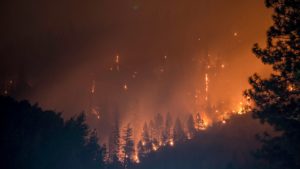
Photo by Matt Howard on Unsplash
Now there are tens of thousands of scorched acres between me and my memories of that place. I bless the ground between us. Given time and water, it will renew, but I think water is no longer a certainty and my lifetime will have run its course before the land recovers and the forests regrow. In a strange sort of way, the desolation of all that scorched earth echoes the desolation I feel as I watch nations, communities, and people become more divisive and competitive. It seems we’re getting more and more skilled all the time at scorching the ground between us, soaking it in blood and then sowing it with salt. We do not forgive differences. We carry hatred between peoples from one generation to the next, and many are at work in the world to increase the divisions by fanning the flames with rhetoric and disinformation, and pouring gasoline onto the fire in the form of resentment, ignorance, and fear.
We do not forgive. We are not forgiven.
Never have despair, powerlessness and fear seemed so darkly seductive to me as they do in these times. My experience is only an infinitesimal part of what’s happening now on Planet Earth, and I’m quite sure we have not yet descended as far as we’re going to. At times, it’s only by deliberately stoking my stubbornness and will and refusing to take my gaze away from where my power is that I continue to cling to faith in some kind of a cosmic balance and plan in spite of fear.
I’ve been spending a lot of time recently thinking about my family and dealing with some of the aforementioned unfinished business. I’ve written letters, both to the dead and to the living, some that have been sent and others that never will be. As I make new friends, I listen to what we talk about, watch how we get to know one another and feel the flowing give and take of compassion and support healthy female friendships create.
“I wondered if that was how forgiveness budded; not with the fanfare of epiphany, but with pain gathering its things, packing up, and slipping away unannounced in the middle of the night.”
― Khaled Hosseini, The Kite Runner
Over and over again, in all these places in my life, I stumble upon the theme forgiveness: The power of it; the terrible, helpless pain of feeling unforgiven; the weapon we make of it; the fear we will not be — cannot be — forgiven for whatever our particular stain or shame is. I have lately asked myself and others: Am I unforgivable? Can that be true? Can love be true without forgiveness? How do I continue to demonstrate love and connection in the face of obdurate unforgiveness? When others told me I was unforgivable, did they mean it, or am I still bleeding over something they have, in fact, forgiven?
It struck me this morning, as I lay in bed at 6:00 a.m. with the rattling roar of the window air conditioner in my ears and the damp sheet over my sweaty body, I’ve once again lost my way, been seduced by the false comfort of victimhood. I’ve been lost in the tangled maze of all those messy feelings and forgotten, temporarily, the point is not what anyone else does about forgiveness. The point is, and the power resides in, what I do with it. Furthermore, the biggest question of all is the one I haven’t been asking.
Can I, do I, will I forgive myself?
That’s where my power is.
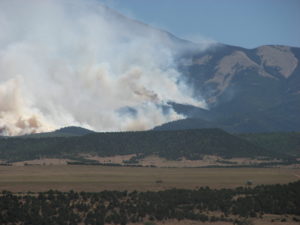
East Peak Fire, Huerfano County, CO 2013
Can I forgive myself for living in this lovely green, lush, landscape where we do still have water? Can I forgive myself for reading the signs of what was to come in the long, unending drought and fires in my old place and leaving before I was forced out by climate change and fire? Can I forgive myself for the mother, daughter and sister I was and am? Can I forgive myself for loving, trusting, hoping, believing, trying, accommodating, pleasing and failing? Can I forgive myself for all the years of neglect, silencing and abuse I colluded with and perpetrated toward myself? Can I forgive myself for now recognizing and responding to my own feelings and needs first? Can I forgive myself for writing or speaking the simple truth?
Forgiveness is a slippery concept, like tolerance. I don’t think of forgiving as forgetting. I’d be foolish to forget what I’ve learned as I interact with others. I’ll cripple myself if I don’t forgive. For me, forgiveness is an integral part of loving. Forgetting is not. Nor do I equate forgiveness with trust. Trust can be lost and rebuilt, but it takes time. Trust depends on forgiveness, but forgiveness doesn’t necessarily include trust.
I’m not at all sure we can create a better world together without forgiveness. I’m quite sure we won’t forgive one another if we’re unable to forgive ourselves. As resources shrink, we’re going to be forced onto a more level playing field in terms of our standard of living. Some of us have a lot more to lose than others. The have-nots are filled with rage. The haves are filled with fear.

Photo by Evan Kirby on Unsplash
There will be a lot to learn in the years ahead. I might as well start now to work with forgiveness, to befriend it, to embrace it, and to talk about it. Forgiving and letting go are both easier for me to do externally than internally, but internal work is the one place where we all have equal power. That’s where it must begin. We’re going to need our power, and we’re going to need to manage it well in order to survive. When our houses, businesses, cars and stuff disappear in fire, storm and flood, when our arable land becomes too hot to grow food, when no water comes from the tap and when money no longer allows us to pretend it’s not all happening, then we will rediscover what true power is, and then perhaps we can begin to bless the ground between us, forgive what has come before, and find new ways to collaborate and cooperate with the living system we call Earth.
In the meantime, I think I’ll stop begging others for forgiveness and concentrate on the places where I have power. Others may think of me as unforgivable, but I needn’t agree, and no one can prevent me from forgiving another.
“The weak can never forgive. Forgiveness is the attribute of the strong.”
― Mahatma Gandhi, All Men are Brothers: Autobiographical Reflections
My road to self-forgiveness may be long. It’s hard to take back the power of forgiveness, because now I have to be responsible for granting or withholding it. In some ways, it’s easier to beg others for it. If it’s not forthcoming from others, well, it’s not my fault. The path of self-forgiveness, though, is all up to me. It will be interesting to discover what sort of shame, guilt and self-loathing lurk in my internal terrain. It will be interesting to challenge the power of what others think and navigate by my own stars and compass. It will be interesting to put out fires on my side and observe whether others are invested in keeping them smoldering or assist in quenching them so the ground between us can heal.
Here’s a poem by Wendell Berry mapping the journey of self-forgiveness. It’s a good map. I’m taking it with me.
Do Not Be Ashamed
You will be walking some night
in the comfortable dark of your yard
and suddenly a great light will shine
round about you, and behind you
will be a wall you never saw before.
It will be clear to you suddenly
that you were about to escape,
and that you are guilty: you misread
the complex instructions, you are not
a member, you lost your card
or never had one. And you will know
that they have been there all along,
their eyes on your letters and books,
their hands in your pockets,
their ears wired to your bed.
Though you have done nothing shameful,
they will want you to be ashamed.
They will want you to kneel and weep
and say you should have been like them.
And once you say you are ashamed,
reading the page they hold out to you,
then such light as you have made
in your history will leave you.
They will no longer need to pursue you.
You will pursue them, begging forgiveness.
They will not forgive you.
There is no power against them.
It is only candor that is aloof from them,
only an inward clarity, unashamed,
that they cannot reach. Be ready.
When their light has picked you out
and their questions are asked, say to them:
“I am not ashamed.” A sure horizon
will come around you. The heron will begin
his evening flight from the hilltop.

Photo by Yuan Yue on Unsplash
All content on this site ©2018
Jennifer Rose
except where otherwise noted
by Jenny Rose | Apr 11, 2018 | Power
I’ve written before about two positions of power: Power-over (maintaining or creating power inequality) and power-with (maintaining equal power). I’ve thought of this as a complete dichotomy, an either/or lens through which I look at all interactions and relationships, both mine and those around me. Lately, though, I’ve seen two other dimensions in the way we manage power. We are agents of power enhancement or power degradation.
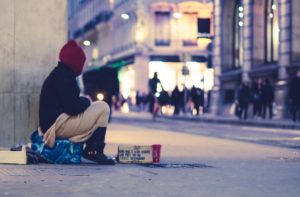
Photo by Ev on Unsplash
Power enhancement and power degradation are the states between power-over and power-with. If we seek to steal the power of others, we begin by sabotaging cooperation, negotiation and equal access to resources — all those things that create communities based in power-with. If our sabotage is successful, power degradation begins. We don’t have complete power-over, not yet, but we are beginning to break down independence, self-sufficiency and the boundaries of others. We are actively working behind the scenes, slowly and subtly corrupting power wherever we can. We might, at this point, have a change of heart and begin fostering behaviors and situations that recreate and enhance power-with, or we might continue with our goal of power-over. Once our goal is attained, we can cease to lurk in the shadows (or under our sheepskin) and come into the spotlight, flushed and triumphant, bloated with stolen power and proud of it.
On the other hand, if we seek to empower others who have been embedded in a power-over dynamic, we begin by managing our own power in such a way that we enhance the power of the disempowered and degrade the power of those maintaining or creating a power-over status quo. Ideally, we don’t give our power away, because that’s a finite resource and leads to burnout and exhaustion. A better way is to use our power to teach, to lead, to support, to legislate and to generally become the wind beneath someone else’s wings. In other words, we appropriately invest our power into teaching others how to discover, reclaim, maintain and manage their own.
An abused child or woman is not going to know how to take care of themselves and function, even if their abuser is magically whisked away. They have to learn. Actually, first they have to unlearn what they already know — all the coping mechanisms that kept them alive in their situation but won’t work well in the wider world — and then they have to learn new skills and behaviors. That takes time, appropriate support from power enhancers and protection from power degraders, at least temporarily, while the victims of power-over learn how to find and reclaim their own power.
The people who live and embody these two intermediate positions of power, enhancers and degraders, are my people — the caregivers. We are the parents and the teachers; the mentors, spiritual leaders, coaches, medical professionals and volunteers who work at shelters, missions, soup kitchens, and out of tents in far-flung places. Interestingly, most of these folks once came from the exterminated middle class. Also interestingly, we see frequent headlines about how some people in this group misuse their position of power and authority in the guise of “helping” others. Shielded by the mask of a power enhancer, they act as power degraders, abusing and exploiting others unchecked, sometimes for decades.
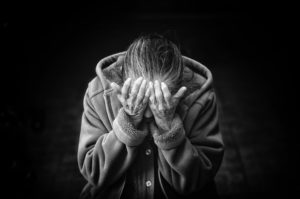
Photo by Cristian Newman on Unsplash
Power enhancement and degradation are not black/white good/bad positions. Many grassroots organizations seek to degrade power in an effort to address our power-over culture and help others reclaim their rightful power. You might say their agenda is to equalize power. The Southern Poverty Law Center is an excellent example. As parents, we might hope to work as power enhancers for our children. As resistance volunteers, we might work against organizations supporting inequality.
It’s important to note our culture doesn’t financially support people in these positions of power particularly well. Teachers strike for better pay. Coaches lay down their lives in bullet-riddled school hallways. Nurses and doctors are vulnerable to addiction, burnout and fractured relationships. Ditto police and firefighters. Compassion fatigue is epidemic. None of these people are millionaires, and some are becoming homeless in places like California as the cost of housing skyrockets. I also note how many of these positions are filled by volunteers. I myself did volunteer fire and rescue work for years, and then animal rescue work and hospice. Red Cross depends on its volunteers. Many healthcare facilities and schools rely heavily on volunteers, as well as sports teams, churches and countless human rights organizations.
Yet it seems to me power enhancers and power degraders are the most important people in our communities. They have the ability to lift others up into integrity and excellence or destroy them. They shape our health, the way we learn and think (or not, sadly), and our spiritual wellness. We trust them with our children, our souls, our secrets and our lives. When they stumble, burn out, fail or waver, we roar with fury, demand justice and retribution, riot and demonstrate, never considering we are the ones who put them in such dangerous, risky, heartbreaking and impossible positions in the first place. We place them on the front lines, put them under constant public scrutiny and pressure and make them responsible for understanding and fixing our increasingly unequal and dysfunctional social power dynamics.
Consider what a professional athlete gets paid, or an entertainer, or a “successful” politician. Compare that to what your children’s teachers are paid, or your local police or fire people, or your nurse practioner or the local softball coach or scout leader. Who has more direct influence in your life and well-being? Who will come help you in the middle of the night, organize community support or assist you with wedding or funeral arrangements?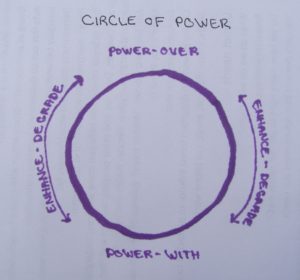
Here is a graphic demonstrating the circle of power. (Please take a moment to notice the cutting-edge high tech used to generate this graphic. Impressive, yes?) Currently, a power-over dynamic is running the show, and it lies directly across the circle from power-with. We each occupy a place or places along the circle of power, and those places are dynamic and fluid, depending on the daily and even hourly choices we make. Some people spend most of their lives trying to equalize power between people while others work tirelessly to create and maintain unequal power. We all, whether consciously or not, behave in ways that degrade or enhance our own power and the power of others.
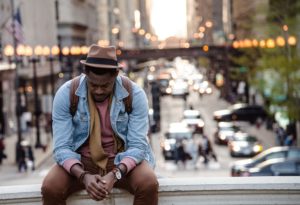
Photo by whoislimos on Unsplash
Nobody teaches us about power. Not our parents or schools, and certainly not the media. Yet our inherent rightful power and our need to manage it appropriately and effectively transcends ability level, age, race, sex or socioeconomics. Individual power is apolitical. We all can take the same class, if only we can find teachers.
The problem is, there is no class and our best teachers are exhausted, demoralized, underpaid, underappreciated, overworked and drowning in a crippled education system while others are busy exploiting their positions in order to degrade the power of their students and colleagues. Even if some of the former know something about power management, they’re not in a position to teach anyone else about it. Power management and emotional intelligence skills (which are inextricably intertwined) are not going to show up on a standardized test or entrance exam.
We don’t know how to manage and maintain our power. We haven’t learned it and we can’t teach it. Yet we expect those people who support, protect and serve our communities, all those people who take intermediate roles of power enhancers and degraders, to remain uncorrupted and infallible and spotlessly kind, compassionate, moral, ethical, and just plain GOOD. We give them power and authority blindly, because we can’t recognize appropriate power management from inappropriate either, and expect them to figure it out and do the right thing. We sure as hell don’t know what to do! When that doesn’t happen, we’re angry and we look around for someone to blame, someone or something to scapegoat.
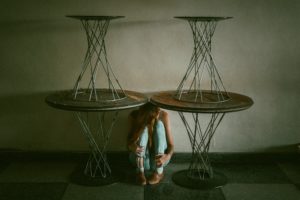
Photo by Talles Alves on Unsplash
How can we expect things to get better if we don’t make some changes?
I suggest we must begin at the beginning, at the foundations, with our children, which means a new paradigm of parenting. Every single adult coming into meaningful contact with a child must be reeducated about the continuum concept and connection parenting. Children need appropriate connection and bonding throughout childhood. If that happens, they learn emotional intelligence and become secure, confident, curious, joyful people who practice power-with as a matter of course, because their own power has never been corrupted or coerced.
How do we freeze everyone in their tracks, wipe their data banks clean and overwrite with better information? How can meaningful change take place if we don’t?
Don’t ask me. I can think about it and write about it, but I have no idea how to tackle such an overwhelmingly impossible task, even if everyone would consent to it, and most won’t. They don’t want to give up whatever power they feel they do have, even if it’s just over their children.
In the meantime, there’s only this small attic room; a grey, chilly spring day outside; and whatever I do or don’t do with my portion of personal power this minute, this hour, this day. I will make choices to enhance or degrade the power of everyone I interact with, including myself. I’ll write, go swimming and pick up birdseed for our empty feeders. I’ll observe others, think about power and try to make mindful choices.
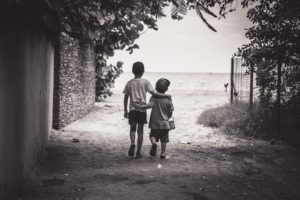
Photo by juan pablo rodriguez on Unsplash
All content on this site ©2018
Jennifer Rose
except where otherwise noted
by Jenny Rose | Mar 22, 2018 | Power
Resilience is “the capacity to recover quickly from difficulties.” (Oxford Dictionaries.) One of the most prevalent difficulties in modern life seems to be the ever-growing cacophony of Those Who Are Offended. I’ve been thinking about this for some time, but last week I read an interview with author Lionel Shriver that brought my own sense of offense to a head. Here’s a quote from that article:

Photo by Syd Wachs on Unsplash
“Shriver … is not the first to argue that the right to give offense is one of the very foundations of freedom of speech. ‘We’re moving in the direction of enshrining the right not to be offended, which is the end of liberty and certainly the end of good books.'”
Oxford Dictionaries defines offense in four ways:
- A breach of law or rule; an illegal act.
- A thing that constitutes a violation of what is judged to be right or natural.
- Annoyance or resentment brought about by a perceived insult to or disregard for oneself or one’s standards or principles.
- The action of attacking someone or something.

Photo by David Beale on Unsplash
The principle of free speech is taking a real battering in the United States. It’s a one-size-fits-all justification for whatever beliefs and ideologies we espouse. Freedom of speech, however, is not absolute. There are limitations around it intended to protect community and individual rights, including the “offense principle,” a restriction based on perceived offense to society. Freedom of speech is a principle that relies on social guidance, which is to say the intelligence and compassion of us, we the people.
This is a problem in a nation where compassion is daily more distorted and taken advantage of and critical thinking and civil discourse are increasingly difficult to come by. Who gets to define “perceived offense to society?”
Everywhere I look, listen and read, I observe people who appear to believe they have a right not to be offended. Freedom of speech grants such people the right to be offensive, as they’re quick to point out, but it’s only a one-way street. Offensive ideas and beliefs are becoming a broad category. Disagreement is offensive (and hateful and bigoted). Certain words, like ‘uterus’ are becoming offensive. Certain pronouns are offensive. Real or perceived exclusion is offensive. A perception of cultural appropriation is offensive. Identity politics of any sort are offensive. Science and evidence-based thinking are offensive. Name any religion or spiritual framework you like — it’s offensive.
When did we become so precious, infantile and entitled that we stopped dealing effectively with being offended?
When did the cancer of selfishness destroy our willingness to consider the needs of those around us?
When were individual distorted perceptions given power over a larger, more common good?
When did disagreement, questions and citing scientific data begin to earn death threats?
Our social, cultural and political landscape is enormously complex, at least at first glance. We’ve become fantastically and gleefully skilled at silencing, deplatforming, invalidating, gaslighting, projection and the fine art of withering contempt. We suffer from an epidemic of what I call Snow White Syndrome. Remember the wretched queen stepmother and her mirror? “Me, me, ME, not you! I’m the fairest, I’m the best, I’m the most victimized, I’m the most downtrodden, I’m the richest, I’m the most offended!”
At first glance, as I said, it’s all so complex. At second glance, it’s all distraction and bullshit. The bottom line is always a power dynamic. Is an individual or group requesting or demanding power-with or power-over?
It really is that simple.
I’m offended every single day. School shooters offend me. Tantruming and pouting politicians offend me. Silencing tactics offend me. Being forced to deal with the sexual fetishes of others offends me. The list goes on and on. You know who’s responsible for dealing with all this offense?
Me.
It’s not your responsibility to refrain from offending me, and it’s not my business to tippy-toe around your delicate sensibilities, either. Many of us try to approach others with kindness and courtesy, but that doesn’t mean we’ll receive either in return. I don’t expect the world to accommodate me. Life is not fair. Equality is an ideal rather than a reality. Inclusivity is not a right.
My rights and needs are as important, but not more important than anyone else’s.

Photo by James Pond on Unsplash
Individuals and groups who lobby to take away the rights of others work from a power-over position. They’re weak and fearful and use violence and intimidation to distract others from their impotence. Individuals and groups who lobby to create more equal power dynamics work from a power-with position. They’re confident and seek authentic connection through information sharing and constructive contribution toward the well-being of all.
Resilience, not priggish rigidity or sheep-like agreement with the prevailing social fashion, always wins the evolutionary jackpot. Resilient life flexes and bends, masters new environments, learns and successfully reproduces, continues. Life that doesn’t dies. Evolution is not personal. It makes no distinctions between a human being and a cockroach. Evolution has a lot of time, millions upon millions of years. The ebb and flow of species on earth is nothing but ripples. Patiently, intelligently, life begins again, over and over, building its complex web.

Photo by Biel Morro on Unsplash
If we can’t figure out how to live in harmony with our bodies, our communities and the earth, we will be deselected. Walking around with a mouth like a pig’s bottom because we’re offended, mutilating and poisoning our bodies, creating sexual pathology that interferes with our ability to reproduce our DNA, wasting our time and energy engaging in idiotic arguments and eradicating education and critical thinking will all lead to deselection, and it should. Such a species is more destructive than constructive to all the other forms of life on this planet.
Difficulties of all kinds are a given. They always have been. Difficulties are the pressures that shape us and make us stronger — or deselect us. If we want to survive, we need to put aside our offended sensibilities and concentrate on the things that contribute to the stuff of life: food, water, shelter, connection, raising healthy children, our physical and mental health and the well-being of Planet Earth. It seems to me that’s enough to be going on with. If we can’t begin to achieve resilience, the debate over who gets to use which bathroom becomes as moot as it is ridiculous.
Resilience can be learned. We foster it by letting go, learning to be wrong, exercising our intelligence, and forming healthy connections so we can learn from one another, figure out how to share power and support one another. Life was never advertised as a free ride. The privilege of life comes with responsibility, demands and competition. Taking offense is not a life skill. Malignant destruction of life, either our own or somebody else’s, is not a life skill. Taking our proper place in the food web and the natural cycles of life and death, on the other hand, is essential if we expect to continue as a species.
Life, in the end, is for those sensible enough to live it, and part of surviving and thriving is resilience. Maybe, if we can get a grip and refocus on what matters, we can learn from the cockroaches, viruses, bacteria, mice, flies, ants, crows, soil organisms and many others that have figured out how to adapt and evolve through every difficulty they encounter.
Offended? Get over it.

Photo by Jonathan Simcoe on Unsplash
All content on this site ©2018
Jennifer Rose
except where otherwise noted
by Jenny Rose | Mar 15, 2018 | Power

Photo by Vladislav M on Unsplash
I’ve always been fascinated by the psychology of survival. I observe that we as a culture are obsessed with heroes and rebels and the endless struggle between archetypal good and evil. Survival kits are becoming a thing in marketing. Preppers write blogs and have TV shows.
Interestingly, our social and cultural world actively inhibits our ability to survive in all kinds of ways. Public school education might be said to be a long indoctrination in anti-survival. We spend hours with our mouths open in front of screens in dark rooms, enchanted by movies and games. Congregations of fans share reverence for comic book characters and the happenings in galaxies far, far away. We debate, criticize and celebrate the way these carefully constructed heroes dress, speak, look, act and collaborate with special effects. We have high expectations of our heroes. We imbue them with nostalgia. We expect our heroes to be just, compassionate, intelligent, interesting, attractive, moral, humorous, strong and poised.
Meanwhile, dangerous events take place in our families; in our workplaces, subways, airports and schools; in our world.
We wait for someone to neutralize the danger, clean it all up, drain the swamp, and make it all fair. We wait for rescue. We turn a blind eye. We do whatever it takes to distract ourselves from uncertainty, fear and our own powerlessness. We watch the beast lumber toward us and deny its presence, deny its existence until we find ourselves in its belly, and then we still refuse to believe.
I’ve been reading author Laurence Gonzales. He’s written several books (see my Bookshelves page). We have Deep Survival and Everyday Survival in our personal collection. Gonzales has made the subject of survival his life’s work. He’s traveled extensively, synthesized studies and research and spent hundreds of hours interviewing people involved with all kinds of catastrophes, both natural and man-made. His books are thoughtful, well-written, extraordinarily well researched and utterly absorbing.
Gonzales uncovers the astounding complexity of human psychology and physiology as he explores why we survive, and why we don’t. He’s discovered some profound and surprising truths.
The best trained, most experienced, best equipped people frequently do not survive things like avalanches, climbing accidents, accidents at sea and being lost in the wilderness. Sometimes the youngest, weakest female has been the sole survivor in scenarios like this. It turns out some of the most important keys to survival appear to be intrinsic to our personalities and functioning, not extrinsic.
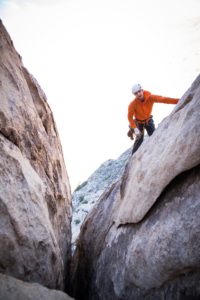
Photo by Tommy Lisbin on Unsplash
Gonzales does not suggest, and nor do I, that training, equipment and experience don’t count, just that they’re not a guarantee. In some cases, our experience and training work against us in a survival situation, because we assume a predictable and familiar outcome in whatever our activity is. We’ve made the climb, hike, journey before, and we did just fine. We’ve mastered the terrain and the necessary skills.
Mt. Saint Helen’s had never erupted before. Therefore, all those people who stood on its flanks and watched in wonder failed to grasp that something new and unprecedented was happening. Their inability to respond appropriately to a rapidly changing context killed them. The same thing happens during tsunamis. People are awed and transfixed. They have no direct experience of a tsunami bearing down on them as the water rolls back to expose the sea bed. They don’t react in time.
There’s a model called the OODA loop. The acronym stands for Observe, Orient, Decide, Act. Our ability to move quickly through the OODA loop is directly linked to our ability to survive.
Observation, the ability to be here now, the ability to recognize what is, is something everybody can practice all the time. No special equipment or training needed. What is needed, though, is the emotional and cognitive willingness (consent, if you will) to set aside our distractions, addictions, rigid preconceptions and expectations (often invisible to us, making them even more deadly) and dependence on stimulation. It also requires a mind set of self-responsibility. It turns out movie theatres, schools, concert venues and many other places are not safe. We can debate, deny and argue; protest and rally; scapegoat and write new laws. We are and we will. In the meantime, the reality is we are increasingly unsafe in many public places, and no one has the power to wave a wand and take care of that for us.
It’s up to us to take care of ourselves. That starts with observation.
In my post on self-defense I mentioned situational awareness. Our instructor emphasized that skill as being more important than any other move or weapon. If we see or sense something dangerous in our vicinity, it’s up to us to orient and move to a safer location.
That brings up another very important survival skill: instinct. At this point science cannot measure instinct, but Gonzales’s instinct about getting on a certain plane saved his life once, and many of us have similar stories. As far as I’m concerned, instinct is part of observation. What do we observe? How do we feel about what we observe?
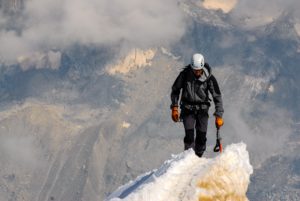
Photo by Wynand van Poortvliet on Unsplash
Our instinct is blunted in all kinds of ways. It’s mixed up with political correctness, including racial profiling. Few of us want to demonstrate discomfort around others for any reason these days. I invariably feel guilty when I react to someone negatively, even if my reaction is entirely private. It’s bad and wrong to judge, to cross the street to avoid somebody. It’s ugly and hateful.
Additionally, I’m a woman and I’m highly sensitive, which makes me particularly attuned to body language, voice inflection and all the clanging (to me) subtext of communication beneath whatever words are spoken. I can’t prove my intuition. I can’t demonstrate it logically. I have no wish to diminish or disempower others. I’m not a bigot. All people have energy and sometimes it’s foul. I reserve the right to move away from it. If that makes me hateful, woo, dramatic or hysterical, so be it. I’m accomplished in the art of noncompliance, but many are not.
If we only see what we expect to see, we aren’t observing. If we fail to see what we’re looking at, we’re not observing. If we can’t take in the whole picture, we’re not observing. If we look for something instead of at everything, we’re not observing. We’ve already broken the OODA loop.
Observing and orienting mean coming to terms with what we see. The plane is down. Our ankle is broken. We’re lost in a whiteout blizzard off the trail. We can’t decide how we’re going to survive if we’re unable to accept and orient to what is.
As a young woman, I did fire and rescue work. I was an IV-certified EMT, and I learned in those days that panic, fear and despair are killers. They’re also highly contagious. People who survive lock those feelings away to deal with after they’re safe again. Gonzales found, amazingly, some people will sit down and die, though they have a tent, food and water in the pack on their back. They just give up.
I also learned that the hysterical victims are not the ones most likely to die in a multiple trauma event. They demand the most attention, certainly, but it’s the quiet ones who are more likely to have life-threatening injury and slip away into death. The screamers and the drunks, the ones blaming, excusing and justifying, are frequently the cause of the accident and retard rather than assist in the survival of themselves and those around them.
On the other hand, strength, determination and calm are also contagious. If just one or two people in a group keep their heads and take the lead, chances for survival begin to increase for everyone.
When I was trained as a lifeguard and swimming teacher, I learned something that’s always stayed with me.
You can’t save some people. It’s possible to find yourself in a situation where, in spite of your training and best efforts, the victim is so combative or uncooperative, or the circumstances so impossible that the choice is between one death or two. This fact touches on my greatest impediment to survival, which, ironically, is also one of my greatest strengths.
My compassion and empathy mean I frequently put the needs of others before my own. I do it willingly, gladly, generously and out of love. It’s one of my favorite things about myself, and it’s also one of my most dangerous behaviors.
Consider a scene many of us are metaphorically familiar with. Someone nearby is drowning. They’re screaming and thrashing, weeping, begging to be saved. We throw them a rope so we can pull them out. They push it away and go on drowning because the rope is the wrong color. Okay, we say, anxious to get it right and stop this terrible tragedy (not to mention the stress-inducing howling). We throw another rope, but this one is the wrong thickness. It, too, is rejected, and the victim, who is remarkably vocal for a drowning victim, continues to scream for help.
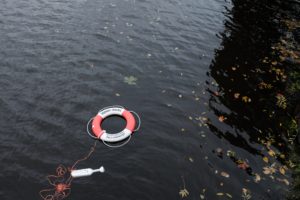
Photo by Lukas Juhas on Unsplash
On it goes, until the rescuer is exhausted, desperate, deafened and feeling more and more like a failure. Meanwhile, the “victim” goes on drowning, loudly, surrounded by various ropes and other lifesaving tools. We, as rescuer, are doing every single thing we can think of, and none of it is acceptable or adequate. In our frantic desire to effect a rescue at the cost of even our own lives, we’ve ceased to observe and orient. We’re not thinking coolly and calmly. We’re completely overwhelmed by our emotional response to someone who claims to want help.
The survivor in this picture, my friends, is not the rescuer. The so-called victim is the one who will survive. If they do grudgingly accept a rope and are successfully pulled out of the water, they immediately jump back in.
The will to survive is an intrinsic thing, and I can’t give or lend mine to someone else. People who can’t contribute to their own survival, and we all know people like that, are certainly not going to contribute to mine, and some will actively and intentionally pull me down with them, just because they can.
I don’t have to let that happen, but in order to avoid it I need to be willing to see clearly, accept what I see, cut my losses and act in my own behalf. Real life is not Hollywood, a comic book or virtual reality. It’s not my responsibility to be a savior, financially, emotionally, sexually or in any other way. The word survivor does not and cannot apply to everyone.
It’s a harsh reality that doesn’t have much to do with being politically correct or approval and popularity, and most people have trouble facing it, which will inhibit their survival if they ever find themselves in an emergency situation.
Gonzales covers this at some length in Deep Survival, and he rightfully points out that compassion and cool or even cold logic are not mutually exclusive. People in extreme situations sometimes have to make dreadful decisions in order to live, and they do. A compassionate nature that does what must be done may buy survival at the cost of life-long trauma. Ask any combat veteran. This is the side of the story the Marvel Universe doesn’t talk about. Survival can be primitive, dirty and gut wrenching. Sending blue light and thoughts and prayers are not the stuff of survival.
Clear orientation leads to options and choices. Evaluating available resources and concentrating on the basics of survival: water, food, shelter, warmth, rest and first aid are essential. Thinking coolly and logically about what must be done and breaking the task into small steps can save people against all odds.
Sometimes, death comes. Eventually, we all reach our last day. In that case, there’s no more to be said. Yet the mysterious terrain on the threshold between life and death is remarkably defining. I wonder if perhaps it’s the place where we learn the most about ourselves.
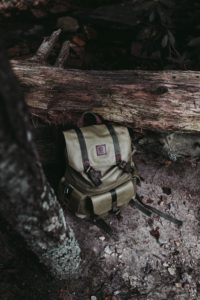
Photo by Andrew Neel on Unsplash
I’ve known people who stockpile weapons and ammo, bury gold in bunkers, build off-grid compounds and obsess about survival equipment and bug-out bags. Many wilderness schools teach basic and advanced survival techniques. Some folks put all their financial resources into prepping for catastrophe and collapse. I’m nervous about the state of the world on many levels myself, so I understand, but I can’t help thinking that investing in a story about living in a guarded, fully-equipped compound is not much better than investing in a story that water will continue to run from faucets, a wall socket will deliver electricity and grocery shelves will hold food, forever and ever, amen.
After reading Gonzales, I’m considering maybe simply living life is the best preparation for survival. Trusting my instinct; learning to manage my power and feelings; being aware of the limitations of my experience, expectations and beliefs are all investments in survival. Simply practicing observation is a powerful advantage. I don’t have money to spend on gear and goodies I might or might not be able to save, salvage or retain if things fall apart. The kind of investment that will keep me alive is learning new skills, staying flexible and adaptive, developing emotional intelligence and nurturing my creativity. No one can take those tools away from me and I can use them in any scenario.
We’re born with nothing but our physical envelope. Ultimately, perhaps the greatest survival tool of all is simply ourselves, our wits and our will.
All content on this site ©2018
Jennifer Rose
except where otherwise noted




























